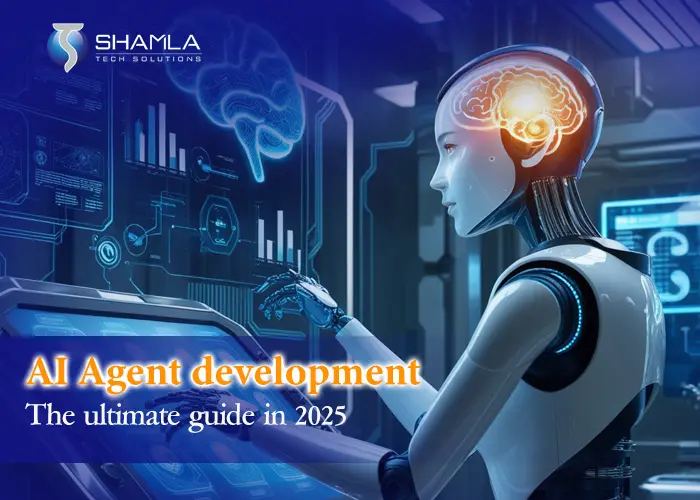Artificial Intelligence (AI) has undergone a transformative evolution, with AI agents emerging as pivotal components in automating tasks, enhancing user experiences, and driving innovation across industries. As we navigate through 2025, understanding the intricacies of AI agent development is crucial for businesses and developers aiming to harness their full potential.
Understanding AI Agents
AI agents, often referred to as Agentic AI, are autonomous software programs designed to perform tasks on behalf of users. These agents possess the capability to learn from data, make decisions, and execute actions without continuous human intervention. Their applications span various domains, including customer service, healthcare, finance, and more.
The Evolution of AI Agents
The journey of AI agents has been marked by significant milestones:
Early Developments: Initial AI agents were simple rule-based systems, limited in scope and functionality.
Integration of Machine Learning: The incorporation of machine learning algorithms enabled agents to learn from data, improving their performance over time.
Advancements in Natural Language Processing (NLP): Enhanced NLP capabilities allowed AI agents to understand and process human language more effectively, leading to more natural interactions.
Autonomous Decision-Making:
Modern AI agents can analyze complex datasets, predict outcomes, and make decisions autonomously, increasing their utility in various sectors.
Key Components of AI Agent Development
Developing a robust AI agent involves several critical components:
1. Data Acquisition and Preprocessing
High-quality data is the foundation of any AI system. Collecting relevant data and preprocessing it to remove inconsistencies ensures that the AI agent learns effectively.
2. Algorithm Selection
Choosing the appropriate algorithms is vital. Depending on the application, this could range from supervised learning models to reinforcement learning techniques
3. Model Training and Evaluation
Training the AI model involves feeding it data and allowing it to learn patterns. Subsequent evaluation ensures that the model performs accurately and generalizes well to new data.
4. Integration with User Interfaces
For AI agents to be user-friendly, seamless integration with interfaces such as chatbots, mobile apps, or web platforms is essential.
5. Continuous Learning and Adaptation
The environment in which AI agents operate is dynamic. Implementing mechanisms for continuous learning allows agents to adapt to new information and evolving user needs
Frameworks and Tools for AI Agent Development
Several frameworks have emerged to facilitate AI agent development:
- LangChain: Focuses on simplifying the creation of AI agents by providing pre-built components and abstractions.
- CrewAI: Offers tools for collaborative AI agent development, enabling teams to work cohesively on complex projects.
- Microsoft Semantic Kernel: Provides a comprehensive suite for building and deploying AI agents with advanced semantic understanding capabilities.
- AutoGen: A framework that automates the generation of AI agents, streamlining the development process.
- SmolAgents: Designed for lightweight AI agent applications, ensuring efficient performance on resource-constrained devices.
- AutoGPT: Leverages GPT models to create AI agents capable of understanding and generating human-like text, enhancing conversational abilities.
These frameworks provide developers with the necessary tools to build, test, and deploy AI agents efficiently.
Applications of AI Agents in 2025
The versatility of AI agents has led to their adoption across various industries:
1. Healthcare
AI agents assist in patient diagnostics, monitor health data in real-time, and provide personalized treatment recommendations, improving patient outcomes.
2. Finance
In the financial sector, AI agents analyze market trends, manage investment portfolios, and detect fraudulent activities, enhancing security and profitability.
3. Customer Service
Businesses deploy AI agents as virtual assistants to handle customer inquiries, provide support, and enhance overall user experience, leading to increased customer satisfaction.
4. Education
AI agents offer personalized learning experiences, adapt educational content to individual student needs, and provide real-time feedback, facilitating effective learning.
5. E-commerce
In online retail, AI agents recommend products based on user preferences, manage inventory, and optimize pricing strategies, boosting sales and customer engagement.
Challenges in AI Agent Development
Despite the advancements, developers face several challenges:
.
1. Data Privacy and Security
Handling sensitive data necessitates robust security measures to prevent breaches and ensure user trust.
2. Ethical Considerations
Ensuring that AI agents operate without bias and make decisions that align with ethical standards is paramount.
3. Integration Complexities
Seamlessly integrating AI agents into existing systems requires careful planning and execution to avoid disruptions.
4. Continuous Updating
The rapid evolution of technology demands that AI agents be regularly updated to maintain relevance and effectiveness.
Future Trends in AI Agent Development
Looking ahead, several trends are poised to shape the landscape of AI agent development:
1. Enhanced Personalization
Advancements in AI will enable agents to offer more personalized experiences, tailoring interactions based on individual user preferences and behaviors.
2. Integration of Multimodal Capabilities
Future AI agents will process and interpret multiple forms of data, including text, images, and audio, leading to more comprehensive and intuitive interactions.
3. Decentralized AI Agents
The development of AI agents operating on decentralized networks will enhance data security and user privacy, reducing reliance on centralized servers.
4. Collaboration Among AI Agents
AI agents will increasingly work collaboratively, sharing information and tasks to achieve complex objectives more efficiently.
Conclusion
As we advance through 2025, AI agents have become integral in automating tasks, enhancing user experiences, and driving innovation across various industries. Their evolution from simple rule-based systems to sophisticated autonomous entities capable of complex decision-making underscores their transformative impact. However, the journey of AI agent development is ongoing, presenting challenges such as data privacy, ethical considerations, and integration complexities. Addressing these issues requires continuous collaboration between developers, businesses, and policymakers to ensure responsible and effective deployment. Looking ahead, trends like enhanced personalization, multimodal capabilities, decentralized networks, and collaborative AI agents are poised to redefine the landscape, offering unprecedented opportunities for growth and efficiency. Embracing these advancements thoughtfully will be key to harnessing the full potential of AI agents in the years to come.
FAQs
1. What distinguishes AI agents from traditional AI solutions?
AI agents autonomously perceive their environment and interact with other systems to achieve objectives, operating proactively without constant user input. In contrast, traditional AI solutions perform specific tasks only when triggered, lacking the autonomous and proactive capabilities of AI agents.
2. What are the key steps in developing an AI agent?
Developing an AI agent involves several critical steps: defining objectives, acquiring and preprocessing data, selecting appropriate algorithms, training and evaluating the model, integrating with user interfaces, and implementing continuous learning mechanisms to adapt to new information and evolving user needs.
3. What challenges might arise during AI agent development?
Developers may encounter challenges such as ensuring data privacy and security, addressing ethical considerations to prevent bias, managing integration complexities with existing systems, and maintaining continuous updates to keep the AI agent relevant and effective in dynamic environments.
4. How do AI agents handle data privacy and security?
AI agents handle sensitive data by implementing robust security measures to prevent breaches and ensure user trust. This includes storing data in secure, managed storage accounts, retaining data only as long as necessary, and ensuring data is not used for training models without explicit consent.
5. What resources are required to develop an AI agent?
Developing an AI agent requires a multidisciplinary team with expertise in data science, machine learning, software development, and domain-specific knowledge. Additionally, access to high-quality data, computational resources, and appropriate development frameworks or tools is essential to build, test, and deploy effective AI agents.
6. How can businesses integrate AI agents into their operations?
Businesses can integrate AI agents by first identifying tasks suitable for automation, ensuring transparency about the AI’s role to build employee trust, and providing comprehensive training for staff to work effectively alongside AI agents. This approach enhances productivity while maintaining a harmonious human-AI collaboration.
7. What are the ethical considerations in deploying AI agents?
Deploying AI agents ethically involves ensuring they operate without bias, make decisions aligning with ethical standards, and maintain transparency in their actions. It’s crucial to address potential issues like data privacy, consent, and the impact of AI decisions on individuals and society to foster trust and acceptance.
8. How do AI agents continuously learn and adapt?
AI agents employ continuous learning mechanisms by processing new data and feedback, allowing them to adapt to evolving user needs and dynamic environments. This involves updating their models regularly to incorporate new information, ensuring their performance remains optimal and relevant over time.








